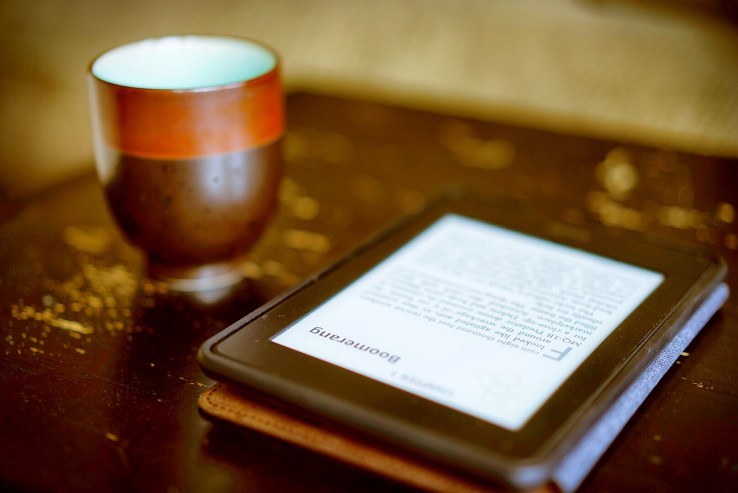Amazon’s Kindle, and its less popular e-reader brethren, are great for fiction, but trying to consume content that isn’t meant to be enjoyed from cover to cover is an exercise in annoyance, frustration and misery. That’s a shame, because it doesn’t have to be that way.
Take travel books for example. When trekking across the globe, lugging around four-and-a-half pounds worth of guide books is an utter pain in the arse. Loading a shelf’s worth of travel books onto an e-reader makes a lot more sense.
“E-books for the win,” I hear you whisper. But alas, the challenge isn’t the weight, but rather the way travelers use guide books. When on the road, you’ll forever find yourself flipping between overview maps, local maps, the “what to do” section for where you are, the “where to stay” section for where you’re going, the “I’m hungry but we’re running behind schedule so we are not where we planned to be” pages and the “oh no, somebody nicked my passport, now what the hell do I do?” chapter.
Paper books are pretty good at what they do
It isn’t really e-books’ fault that they’re occasionally frustrating. It turns out that physical paper books actually have a tremendously efficient user interface. You can use fingers or Post-it notes as bookmarks and flip back and forth between sections faster than you can with any other technology. You can write notes in the margin. You can circle, highlight and rip out pages if you want. You could even do what a friend of mine did in an effort to save weight: cut apart half a dozen Lonely Planet guides and gaffer-tape them back together into a customized travel itinerary.

There are other book types that have similar issues of non-linearity. I recently found myself looking into going back to school and doing a GRE. The official guide is the No. 8 best-seller in its category, but is worse than useless as a study guide. The book is full of useful information, but the Kindle version is absolutely, utterly unusable. The formatting is broken, sure, but that’s the least of its problems.
The book refers to things like “see page 29 for the scoring,” ignoring that most e-readers have no concept of page numbers. The only thing that including these sort of cross-references accomplishes is to tell the reader that they bought the wrong edition of this book: “If you had bought the paper book, this is where we would give you some useful information. Instead, well, here — have a reference that’s utterly useless to you.”
Another face-palm moment pertains to the sample questions and answers. They are separated in the book, but there’s no shortcut/hyperlink between them. That’s just dumb. As a result, you’ll find yourself clicking back 25 times to re-read the question, then forward 25 times to read the answer. Or realistically, you find yourself not doing that, and instead sighing, reaching for your phone and googling “how to get a refund for a Kindle book.”
Not using e-book tech is a terrible waste
Even if the publisher wasn’t aware of the possibility of using the smart tech available to e-book publishers (which might just be an explanation, but a very embarrassing one at that), there are other ways of avoiding the issue. In the case of the question/answer, for example, simply repeating the question would be a solution: It’s not like they’re going to incur extra printing costs or run out of space in an e-book.
For the “see page 26 for more information about X” challenge, the publisher could have said “We will cover X more later in this book.” Not as useful, but at least not actively antagonizing.

In leveling critique at publishers, I don’t even walk away scot-free myself. Quite a few of my own books are available as e-books, and my best-selling book (The Rules of Photography and When to Break Them) is probably the dumbest example of all. As you might imagine from its title, it is full of photographs. A Kindle edition exists, but it simply doesn’t make sense: The book is heavily based on examples, and trying to get a handle on the core concepts of the book on a black-and-white device is going to be an exercise in futility.
Publishers: adapt or perish
The truth is that e-ink books are great for certain things. E-readers are perfect for taking fiction on holiday with you: You can carry a library’s worth of books on a device that has weeks of battery life. And, as a bonus, nobody can see that you’re reading Fifty Shades of Grey. Perfect.
The technology built into the e-readers is maturing rapidly. Highlighting, bookmarking and dealing with footnotes, end notes and cross-referencing is all standard. The biggest change from five years ago is that I can now see myself reading academic works on e-readers without major problems.
Overall, the technology is there. Using platforms such as the iBooks Author or Amazon’s own publishing guides, there is a lot of technology and features available to publishers — much of which is very rarely used. And that, ladies and gentlemen, is a tiny tragedy.

For other uses, such as travel guides and books that rely on graphics and photography, custom apps or (gasp) websites could be a far better solution. For some travelers, something like TripAdvisor or Foursquare might work well, but both those apps rely on always-on Internet connections, and for many travelers, not being connected is either part of the allure of travel or a technological/financial necessity.
Having said all that, bringing travel guides to phones and tablets would make a lot of sense. In addition to beautiful retina color displays, most portable devices have GPS, cameras and a ton of features that make them better suited to the task at hand.
Ultimately, technology will march on, and both e-ink, e-book and other publishing technologies will continue getting better. In the meantime, if publishing wants to survive as an industry, they would be well advised not to keep publishing un-adapted electronic versions of wood-pulp books. If this continues to happen, the best-case scenario is the readership tolerates being patronized — but more realistically, readers will make a mental note never to buy travel guides, academic books or photography titles on e-readers again.
Publishers, if you want to stay in business, stop conning your readers out of money, and instead embrace the advantages of e-book technologies. Singeing your customers with disappointment for a few dollars of short-term profit simply isn’t worth it.






























Comment